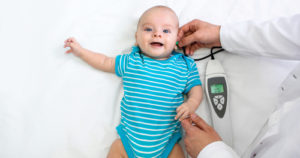
A bipartisan bill introduced by U.S. Sen. Rob Portman (R-OH) to reauthorize current research and bolster public health programs for early detection, diagnosis, and treatment of hearing loss in newborns, infants, and young children is on its way to being signed into law by President Joe Biden.
The Early Hearing Detection and Intervention Act of 2022, S. 4052, which Sen. Portman sponsored on April 7 with lead original cosponsor U.S. Sen. Maggie Hassan (D-NH), on Dec. 6 received approval from the U.S. House of Representatives after being passed by the U.S. Senate on Dec. 1.
“I am pleased this important bill has now passed the Senate and the House,” Sen. Portman said. “I look forward to it being signed into law soon.”
Once enacted, S. 4052 reauthorizes through fiscal year 2027 various activities carried out by the Health Resources and Services Administration, the Centers for Disease Control and Prevention, and the National Institute on Deafness and Other Communication Disorders that support screening and early intervention services for newborns, infants, and young children who are deaf or hard of hearing, according to the congressional record bill summary.
“Early hearing detection is critical because children with hearing loss often fall behind their peers in speech development, cognitive skills, and social skills,” said Sen. Portman. “This bill takes important steps to continue critical programs for early hearing detection and intervention for newborns, infants, and young children.”
S. 4052 is the companion bill to the same-named H.R. 5561, introduced in October 2021 by U.S. Reps. Brett Guthrie (R-KY) and Doris Matsui (D-CA). Sen. Portman’s bill was amended by the U.S. Senate Health, Education, Labor and Pensions Committee in June, passed the Senate by unanimous consent last Thursday, and then the House voted 408-17 to approve it on Tuesday. The bill now heads to the president’s desk for his signature to make it law.
Specifically, the legislation authorizes the development of programs for hearing screening of newborns, infants, and young children, as well as prompt evaluation and diagnosis of children referred from screening programs, according to a bill summary provided by Sen. Portman’s office.
Additionally, it provides for educational, audiological, and medical interventions for children confirmed to be deaf or hard of hearing and allows education and medical models to ensure that newborns, infants, and young children who are identified through hearing screening receive follow-up by qualified early intervention providers, qualified health care providers, or pediatric medical homes, among other provisions, the summary says.



